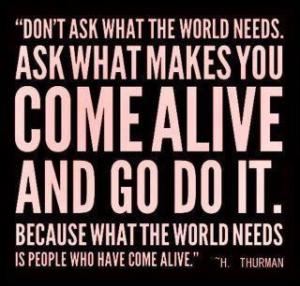“Inspiration often emerges from our work; it doesn’t precede our work.” – Madeleine L’Engle (author of A Wrinkle in Time)
A client emailed me to say she was having a hard time making progress on her book.
I sent her the following message – and thought it might have value for you if you’d like to get in that delightful stream-of-conscious state where the words are flowing out of your head so fast your fingers can hardly keep up.
(Name of client) . .. please keep giving yourself props for writing, writing, writing.
E.L. Doctorow was asked what it was like writing a book.
He said, “It’s kind of like driving a car at night: you can only see to the end of your headlights, but you can make the whole trip that way.”
Keep driving to the end of your headlights.
Keep producing pages and getting your thoughts on paper.
They don’t have to be perfect and they don’t have to be right.
Just getting your thoughts down will trigger more – which will trigger more – and before you know it, your book is out of your head and on paper.
THEN – you can go back and start cleaning it up.
Don’t try to think up what you want to say. That keeps you in your head. Blocked. Stymied.
Just get your thoughts written down. That keeps you moving forward. That produces a momentum where your writing takes on a life and pace of its own.
All the best-selling authors at Maui Writers Conference – from Mitch Albom to Frank McCourt to Nicholas Sparks to James Rollins to Jacquelyn Mitchard – agreed.
Ink it when you think it.
Jot the thoughts when they’re hot.
Muse it or you’ll lose it.
If writing is hard, it’s because you’re thinking too hard.
Free up the flow.
How do you do that?
Get out in nature. Go somewhere the sun is shining. Fill yourself with the fresh air of a beautiful day, the serenity of deep, calm water, the eternal beauty of green trees or a sweeping vista of towering mountains. Drink in the quiet but powerful energy of that place.
Now, ask yourself:
“What do I passionately believe?
What do I feel is important?
What have I learned – the hard way – that might have value for others?
Who is my target reader? What is that person’s name? What is their story? Man? Woman? Married? Single? Kids? Working 60 hours a week? Out-of-work? What are they going through? What’s keeping them up at night? What are their doubts, fears, hopes, dreams? What could I share that would keep them going, help them deal with their challenges, put hope in their heart?
Fill your mind with that person. Picture him or her in front of you.
Now, reach out to that individual with your words.
Put your pen to paper – your fingers to keys – reach down into your gut – and start writing to THEM.
Pour out your heart, mind, soul and insights to THEM.
Make writing a outreach to that man or woman.
No fancy language. No struggling how to say it just so.
Write and reach out to them with your words until you see the light go on in their eyes.
Writing is not meant to be an intellectual execise where you are in your head, thinking, “What can I say?”
Writing is meant to be a communication – a bridge between our experience and expertise and our readers. The question is, “What would they benefit from hearing?”
Write to connect.
Write to share what you know, beleive and feel in a way that might add value for anyone reading your words.
When you do that, you free yourself up to to serve.
Writing is simply a way to pour out, “Here’s what I’ve experienced, observed, learned . . . and I’m sharing it with you in the hopes it might be of benefit.”
Write on.



